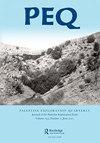The Use of Greek in Palestine: Eupolemus as a Case Study
IF 0.8
2区 历史学
0 ARCHAEOLOGY
引用次数: 0
Abstract
ABSTRACT Eupolemus, a Jewish historian generally dated to the second century bce, is often dismissed as a poor Greek writer. This lack of competency is linked to the assumptions that, as a Jew, he had limited Greek-language education and that he lived in Palestine, where Greek supposedly would have been marginal. The example of Eupolemus is illustrative of two issues in the study of Hellenistic Judaism. First, it calls into question the methods used for determining standard language and the measures by which we assess the style and ability of an ancient writer. Second, it calls for an assessment of the language situation in Palestine in the Hellenistic period. Advances in the study of the history of Greek have enabled a renewed appreciation of post-classical Greek, while twentieth century discoveries have allowed for a better understanding of the extent to which Greek was used in this region. In addition, the study of multilingualism in antiquity has progressed significantly, so that we are able to obtain a more nuanced understanding of Palestine as a multilingual environment where Jews, too, would use Greek alongside Hebrew and/or Aramaic in varying registers and for different purposes. In this article, I describe Eupolemus’s style against the background of post-classical Greek and reassess the link between linguistic proficiency, identity, and provenance.希腊语在巴勒斯坦的使用:以Eupolemus为例
Eupolemus是一位犹太历史学家,他的历史可以追溯到公元前2世纪,但他经常被认为是一位贫穷的希腊作家。这种能力的缺乏与一种假设有关,即作为犹太人,他的希腊语教育有限,而且他生活在巴勒斯坦,在那里希腊语应该是边缘化的。欧波利摩斯的例子说明了希腊化犹太教研究中的两个问题。首先,它对确定标准语言的方法以及我们评估古代作家的风格和能力的方法提出了质疑。其次,它要求对希腊化时期巴勒斯坦的语言状况进行评估。希腊历史研究的进步使人们能够重新欣赏后古典希腊语,而20世纪的发现则使人们更好地了解希腊语在该地区的使用程度。此外,对古代多语言的研究已经取得了重大进展,因此我们能够更细致地了解巴勒斯坦作为一个多语言环境,犹太人也会在不同的登记册和不同的目的中使用希腊语和希伯来语和/或阿拉姆语。在这篇文章中,我将在后古典希腊背景下描述欧波利摩斯的风格,并重新评估语言熟练程度、身份和出处之间的联系。
本文章由计算机程序翻译,如有差异,请以英文原文为准。
求助全文
约1分钟内获得全文
求助全文

 求助内容:
求助内容: 应助结果提醒方式:
应助结果提醒方式:


